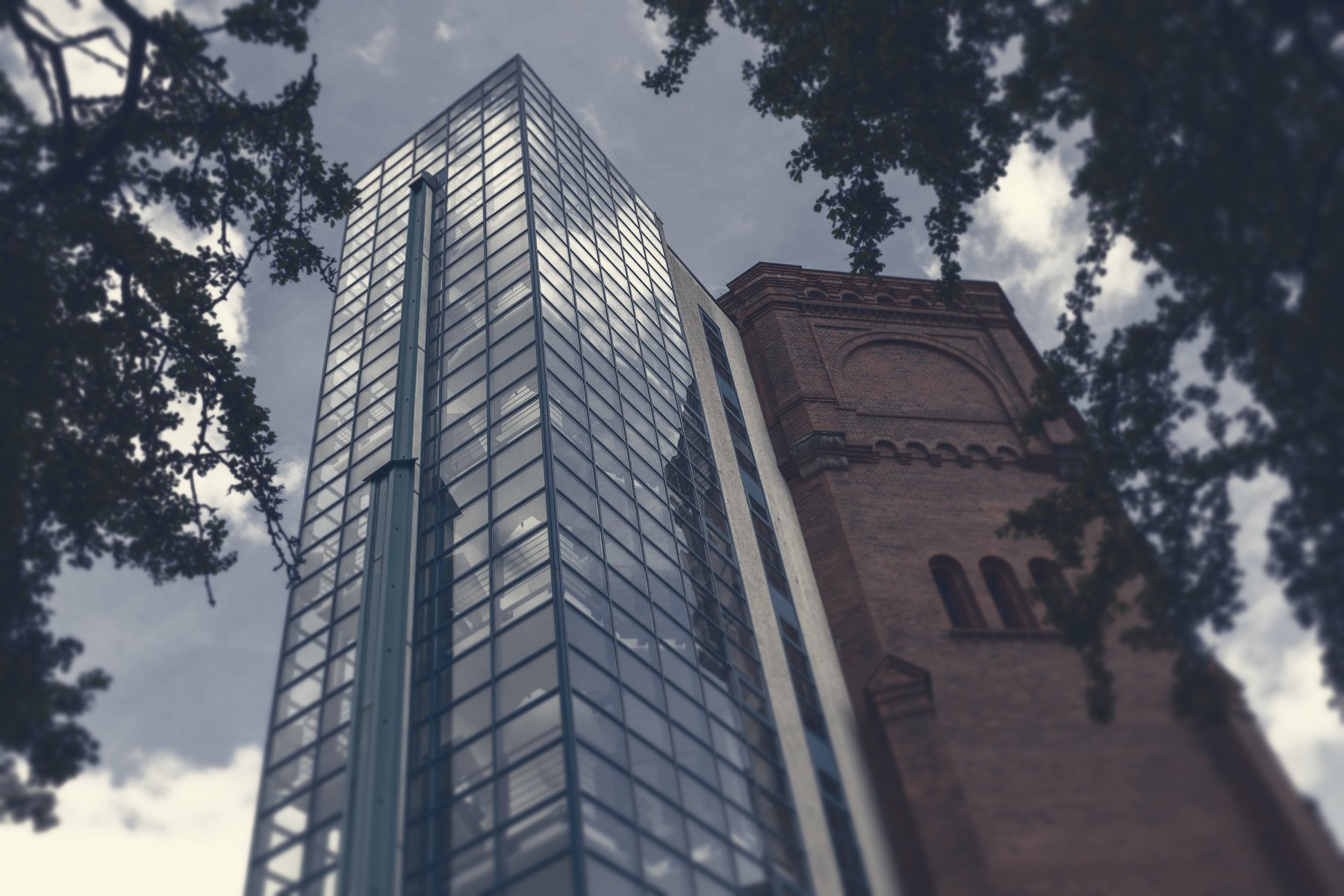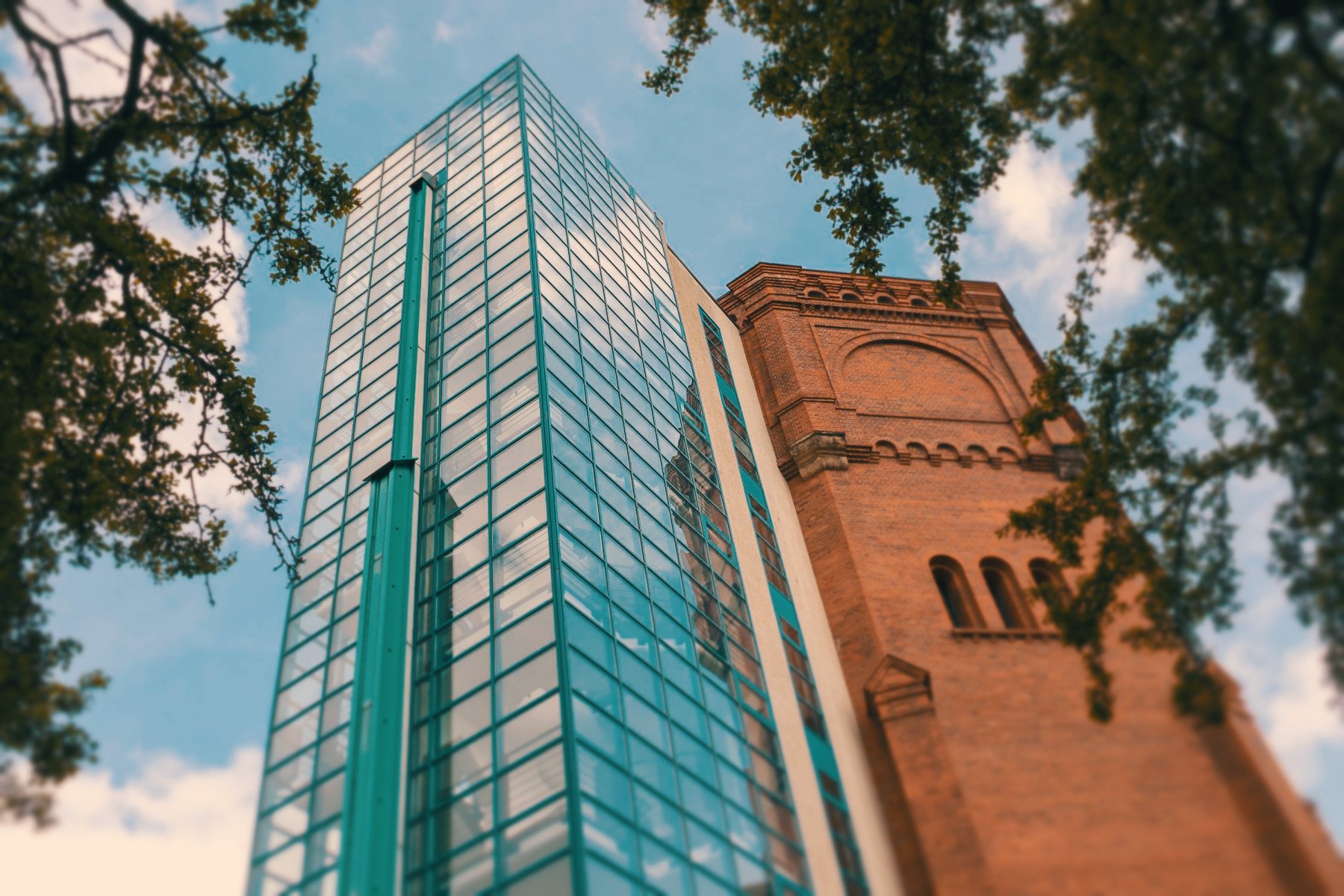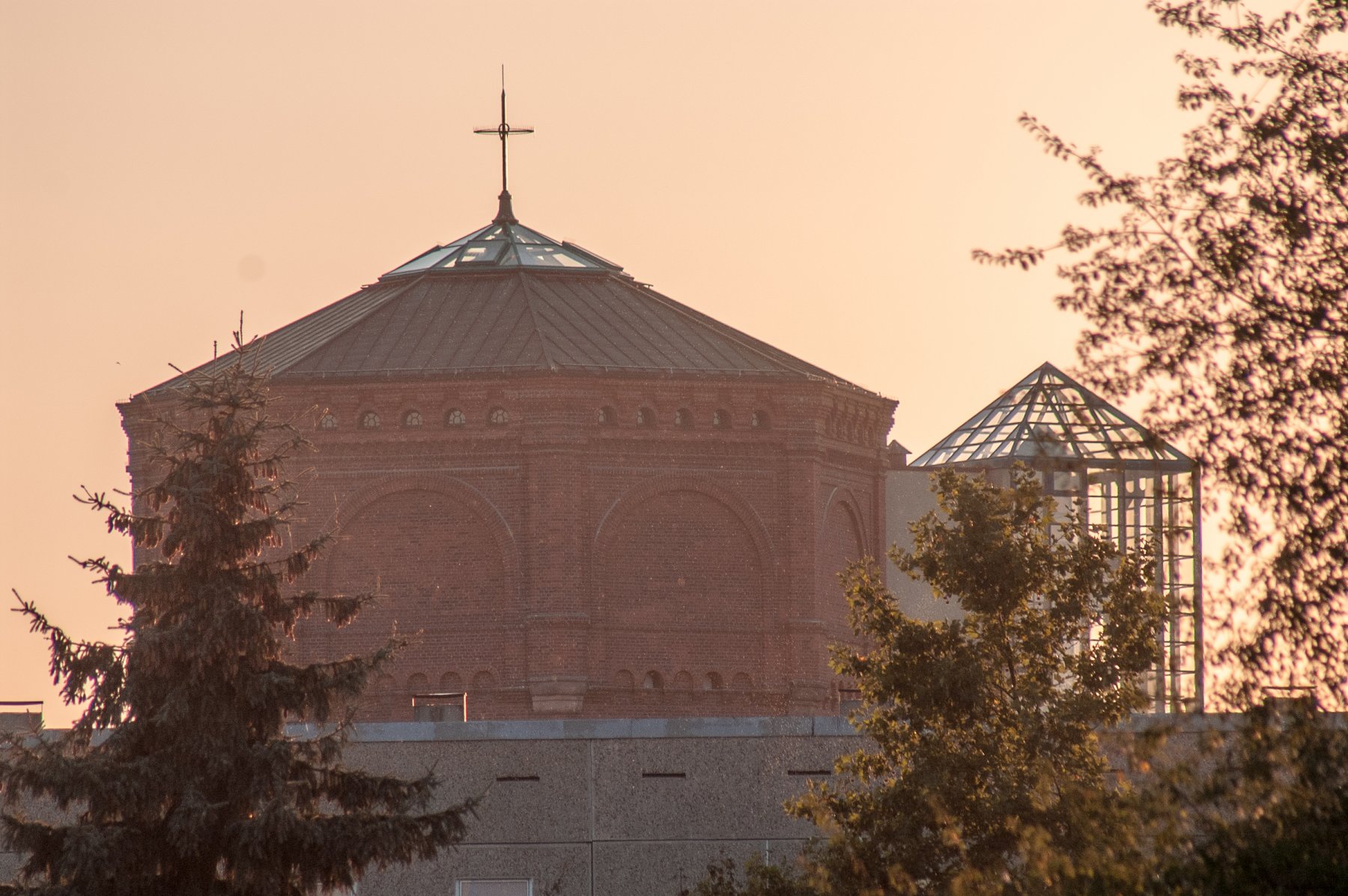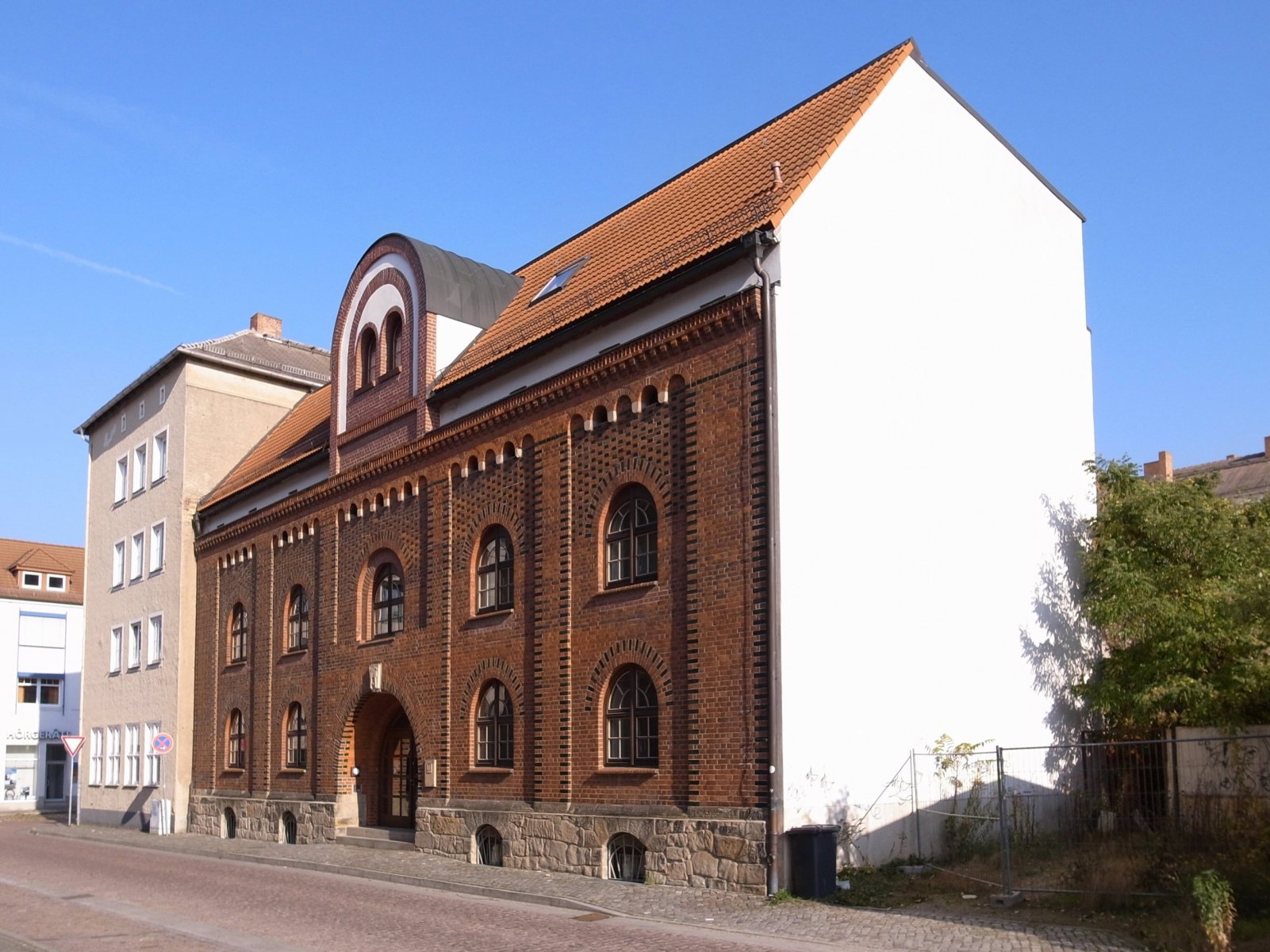about the Archive
Information about the municipal archives of Dessau-Roßlau, which holdings you can view with us and what services we offer.
Archive Regulations
Here you can find the archive regulations and the fee catalog. Please inform yourself about the modalities during a visit to the Stadtarchiv Dessau-Roßlau.
Unfortunately, this is only available in German.
News
If you want to know what’s new in the archive or you want to find out about events in the archive network, take a look here.
Digitisation of a Greek manuscript from the Anhaltische Landesbücherei Dessau for worldwide use


The holdings of the Anhalt State Library (ALB) in the Dessau-Roßlau City Archive include numerous manuscripts from the Middle Ages and the early modern period. A significant collection of such manuscripts in the ALB is part of the book collection of Prince George III of Anhalt. This includes a Greek manuscript of the New Testament from the 15th century with the shelfmark Georg Hs 4, which has become the focus of international scholarly interest.
On 19 May 2025, this manuscript was digitised on site in Dessau-Roßlau by two employees of the Center for the Study of New Testament Manuscripts (CSNTM).
The CSNTM, based in Plano, Texas (USA), is a non-profit organisation whose mission is to digitally preserve Greek New Testament manuscripts. To this end, the centre produces high-quality digital copies of such manuscripts from libraries, museums, monasteries, universities and archives around the world.


The images produced are freely accessible on the centre’s website – a searchable library of currently around 1,700 Greek New Testament manuscripts. With more than 50,000 users exploring manuscripts in its digital library each year, the CSNTM facilitates a partnership between manuscript owners, archivists/librarians and researchers around the world.
With the digitisation of the Georg Hs 4 manuscript, the Anhaltische Landesbücherei Dessau is now part of this special worldwide network. The digitised copies of the Georg Hs 4 manuscript will also be made available to the ALB as a partner institution free of charge for all its own purposes.
‘Over the Reich: The total air war’. A project for the digital mapping of the air war over Germany during the Second World War
Lecture by Professor Patrick Major, University of Reading, UK
4 March 2025, 7.00 pm,
Municipal Archive Dessau-Roßlau,
Heidestraße 21 (Alter Wasserturm)
7 March 2025 marks the 80th anniversary of the destruction of Dessau city centre by Allied bombers against Nazi Germany. This 19th Allied bombing raid on Dessau was part of the large-scale air war over Germany during the Second World War. The lecture ‘Over the Reich: The total air war. A project for the digital mapping of the air war over Germany in the Second World War’ by Professor Patrick Major on 4 March 2025 at the Dessau-Roßlau City Archive, Heidestraße 21 (Alter Wasserturm), will take a look at this air war from the perspective of the Allies. The event starts at 7.00 pm.
The air war over occupied Europe during the Second World War represented a huge theatre of war stretching over 3,000 kilometres from Trondheim to Palermo. To provide an overview, a digital online map was launched in 2020 to illustrate the parallel targets of the Allied air forces: on the one side the industrial targets of the American USAAF, on the other the city centres targeted by the British RAF. Dessau offers a case study of both complexes: the city was home to the Junkers Group and was the victim of a devastating RAF air raid on 7 March 1945. Dessau was also the hub of an entire production system of Junkers branches and underground relocations. The whole thing increasingly came under the control of the SS Economic Administration Main Office. What did the Allied air intelligence services know about this armaments network? Interrogation records of captured Dessau Junkers employees show the extent to which London was kept fully informed. And how did the fateful decision in spring 1945 to inflict a similar fate on Dessau as on Dresden come about? The lecture will be illustrated ‘live’ using the online map.
Patrick Major is Professor of Modern History at the University of Reading. He has published on topics including the history of the GDR and BBC broadcasting policy in Germany during the Second and Cold Wars. The Dessau-Roßlau Municipal Archive and the Association for Anhalt Regional Studies invite you to this event. Admission is free.
Contact:
Stadtarchiv Dessau-Roßlau
Heidestraße 21
06842 Dessau-Roßlau
Phone: 0340/204-1024
E-Mail: stadtarchiv@dessau-rosslau.de


Destruction of Dessau city centre, view of Zerbster Straße, 1945, reference FI 1-0073
100 years of Bauhaus history in 12 objects (Offener Kanal Dessau)

‘It's all over, gentlemen, we're going to Dessau now’, Lyonel Feiniger is quoted as saying in the first video, which he made in 1925.
Part 1 of the 12-video series presents a letterhead ‘das bauhaus in dessau, mauerstraße 36’ from 29 September 1925. This marks the beginning of the history of the Bauhaus in this playlist.
The Bauhaus is closely linked to the city of Dessau-Roßlau. On 23 March 1925, the Dessau municipal council decided by a large majority to take over the Bauhaus from Weimar. On 1 April, Walter Gropius and his staff began their work in Dessau. Teaching began on 14 October 1925 at the School of Arts and Crafts in Mauerstraße.
The video series was created in 2019 for the Bauhaus anniversary by Offener Kanal Dessau. The video and the link below start the playlist on YouTube.
The Dessau war memorial for the fallen of 1870/1871 - insights into the culture of celebration and commemoration in Anhalt loyal to the emperor
Lecture at the Archive Association Dessau, Heidestraße 21 (Old Water Tower)
Tuesday, 12 March 2024, at 7:00 pm
Lecture by Dr Frank Kreißler (Dessau-Roßlau)
The Franco-Prussian War of 1870/1871, in which soldiers from Anhalt fought, ended with a triumphant, comprehensive victory for the Germans and led to the unification of the Reich under the leadership of Prussia. This event prompted contemporaries to look for symbols that would visualise these achievements in a dignified form for the present and future and, in this context, also commemorate the fallen. The war memorials erected in many places fulfilled this function. In Dessau, a war memorial was erected in 1874 as a state memorial for Anhalt, which played a central role in commemorating the war in Anhalt until the First World War.
In his lecture, city archivist Dr Frank Kreißler explains who initiated the erection and with what intentions, describes the appearance of the memorial, which artists were involved in its design, which participants in the war were included in the commemoration and how they were identified. Finally, the enormous significance and culture of remembrance surrounding the memorial at times, but also its disappearance, will be analysed. The Dessau-Roßlau City Archive and the Dessau regional group of the Association for Anhaltic Regional Studies cordially invite you to this lecture on Tuesday, 12 March 2024, at 7 p.m. in the Dessau Archive Association (Alter Wasserturm, Heidestraße 21).
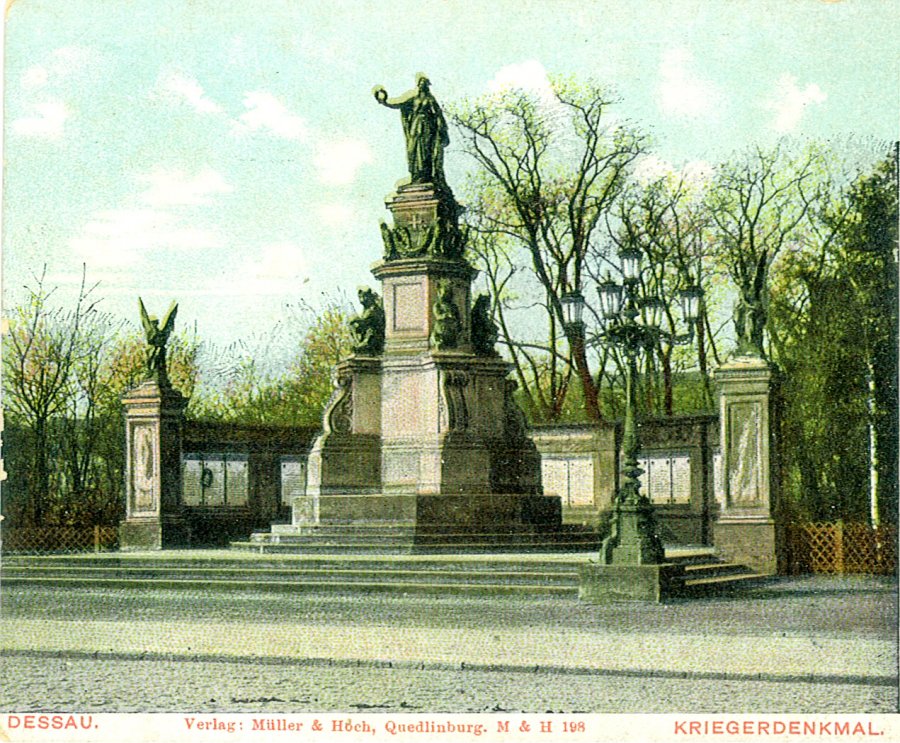

Archival of the month March 2024
Letter from City Councillor Harms to Reich Governor Loeper dated 17 May 1933 with accusations against State Conservator Dr Ludwig Grote
One of the most important supporters of the Bauhaus in Dessau was the art historian Dr Ludwig Grote (1893-1974). He came from Halle (Saale), where he studied art history and completed his doctorate in 1922 with a thesis on the prints of the painter and woodcutter Georg Lemberger (around 1490/1500 – around 1540/1545). In 1923, Ludwig Grote received a contract in Dessau to produce the catalogue of the painting collection in the Amalien Foundation. The following year he was appointed Anhalt State Conservator. He was also the founding director of the Anhaltische Gemäldegalerie Dessau in Palais Reina (Kavalierstraße), which was founded in 1927. Due to his extraordinary professional expertise, Ludwig Grote earned the special esteem of Dessau’s Lord Mayor Fritz Hesse (1881-1973). Alongside Fritz Hesse, the general music director Franz von Hoeßlin (1885-1946) and others, Ludwig Grote was one of the most important supporters of the Bauhaus in Dessau. Among other things, he conducted preliminary negotiations with Walter Gropius (1883-1969) to establish the Bauhaus in Dessau, exhibited Bauhaus artists and acquired their works for the collection of the Anhaltische Gemäldegalerie.
In 1933, Grote, ostracised as a “cultural Bolshevik”, was therefore targeted by the National Socialists. He had to testify in a committee of enquiry brought against Lord Mayor Fritz Hesse for “abuse of office” and chaired by the National Socialist city councillor Dr Richard Harms (1903-?) and was ultimately dismissed from his position as state curator of Anhalt and director of the Anhalt Picture Gallery in Dessau and retired on the basis of the Law for the Restoration of the Professional Civil Service. Councillor Harms summarised the accusations against Ludwig Grote on 17 May 1933 to the NSDAP Gauleiter and Reich Governor in Braunschweig and Anhalt Wilhelm Friedrich Loeper (1883-1935): Grote had been the most ardent supporter of the Bauhaus, the driving force in bringing it to Dessau and responsible for the purchase of what the National Socialists considered to be inferior Dadaist paintings. The letter from Councillor Harms can be seen in the Dessau-Roßlau City Archives as Archive of the Month March 2024.
Dr Ludwig Grote became the first director of the Germanisches Nationalmuseum in Nuremberg in 1951. He died 50 years ago, on 3 March 1974, in Gauting near Munich.
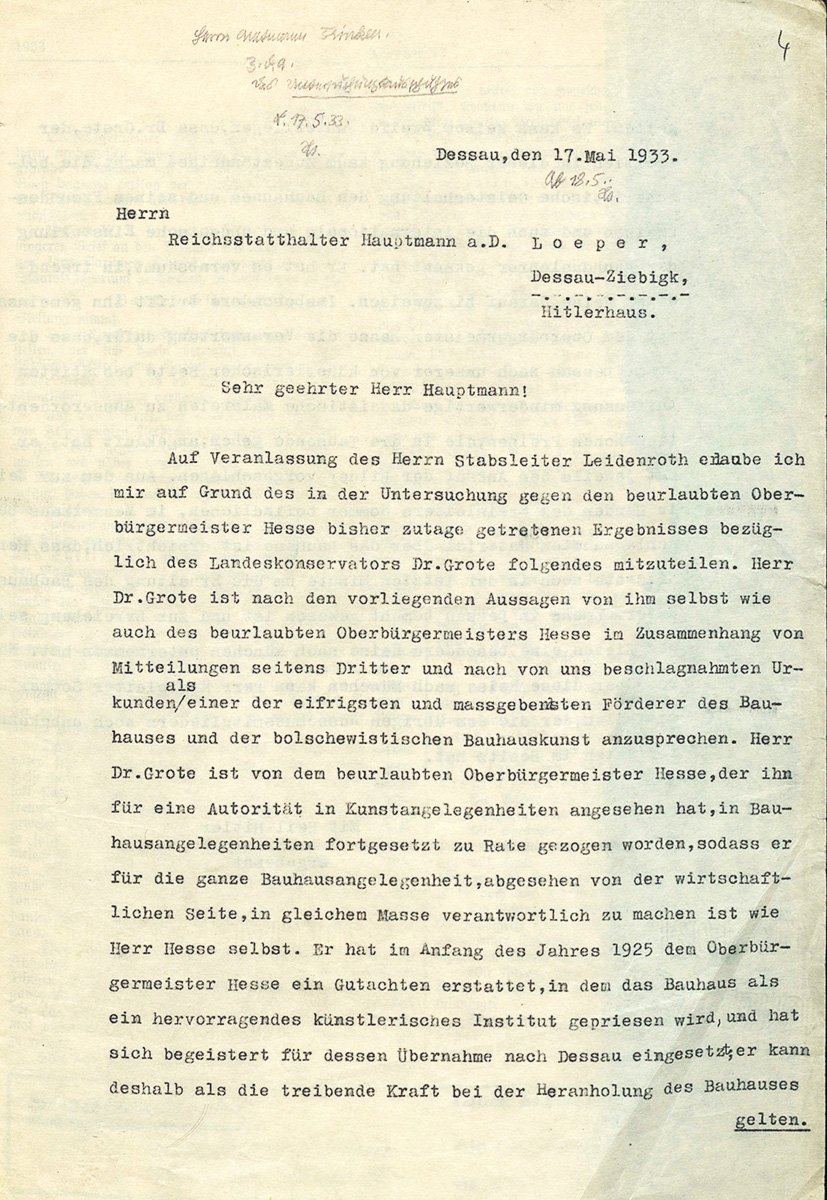

Letter from City Councillor Harms to Reich Governor Loeper dated 17 May 1933 with accusations against State Conservator Dr Ludwig Grote.
Signature: S3-34
Karl Rauch, his publishing house and his art and bookshop in Dessau.
Lecture by Bernd Mühling, Markkleeberg
The businessman and publisher Karl Rauch (1897-1966) opened an art and bookshop in Dessau in 1921, which remained present in the city until its destruction in 1945. At the end of July 1923, he attached a book publishing house to the Kunst- und Bücherstube, the Karl Rauch Verlag. Although there were projects to move the publishing house to Berlin, Munich or Leipzig, they were all short-lived. This was probably due to the wide circle of supporters who stood by him in Dessau. The list of his numerous supporters in Dessau is headed by Hugo Junkers and his wife. A very personal relationship developed with both of them. In addition to Junkers, many other important personalities in Dessau in those years maintained contact with Karl Rauch and came to the readings he organised.
After moving his publishing house to Markkleeberg near Leipzig in 1937, Karl Rauch began to expand the publishing programme. He published contemporary authors from Germany, for example the complete works of Eugen Gottlob Winkler.
This was followed by translations of authors from France, including the first title by Antoine de Saint-Exupéry, Wind, Sand and Stars, in 1939.
From Dessau there were further editions of this book from 1940 onwards. During the bombing of Dessau on 7 March 1945, the publishing house and warehouse perished.After the war, Rauch resumed the publishing business. In 1948, he first moved to Boppard on the Rhine, then in 1949 Düsseldorf became the publishing headquarters, where “The Little Prince” by Antoine de Saint-Exupéry was published in 1950. This year the publishing house celebrates its 100th anniversary in Düsseldorf.
The lecture by Bernd Mühling recalls the work of the publisher Karl Rauch with the help of numerous photos and documents that have never been shown to a larger group of people. This is an event organised by the Verein für Anhaltische Landeskunde. It will take place on Thursday, 12 October 2023, 7 p.m. at Archivverbund Dessau, Heidestraße 21 (Alter Wasserturm). Admission is free.
Conference “Private Libraries in Saxony-Anhalt 1450-1850” in the Municipal Archives
Tradition, social practice and knowledge horizons
The wealth of historical book collections in Saxony-Anhalt is due not least to private collectors. Professional needs and practical concerns could lead to the establishment of libraries just as much as scientific and literary interests or the spirit of discovery. Not infrequently, piety and the desire for representation were also important motives for collecting. Today, private book collections from the Middle Ages and the early modern period are usually part of larger libraries. They were not always completely integrated and handed down; in many cases they have survived only scattered and fragmentary. When they were taken over, their origin and affiliation were often not made clear. Only a few of the private libraries that have survived in Saxony-Anhalt have been well indexed and intensively researched. This has yet to be done for a majority of them.
The conference “Private Libraries in Saxony-Anhalt 1450-1850”, which will take place from 5 to 7 October 2023 at the Stadtarchiv Dessau-Roßlau, Heidestraße 21 (Alter Wasserturm), will provide conceptual impulses and methodological advice. It will present some private libraries, convey the collecting of books as a social practice and demonstrate possibilities to describe historical knowledge horizons in more detail by indexing private libraries. The conference is organised by the Historical Libraries Working Group of the Historical Commission for Saxony-Anhalt in cooperation with the Wittenberg Research Library on the History of the Reformation.
Participation is free of charge. The organisers ask for registration by e-mail to: sekretariat@rfb-wittenberg.de
The conference will be held in German
Program
Thursday, 5 October 2023
from 5.00 p.m. Registration
6.00 p.m. Welcome and opening of the conference Dr Hermann Kinne, Head of the Dessau Department of the Saxony-Anhalt State Archives
Words of greeting:
Klaus Zimmermann, Staatssekretär im Ministerium für Inneres und Sport des Landes Sachsen- Anhalt Dr. Robert Reck, Oberbürgermeister der Stadt Dessau-Roßlau Prof. Dr. Christoph Volkmar, Vorsitzender der Historischen Kommission für Sachsen-Anhalt
Evening lecture
Thiliana – Die Bibliothek des preußischen Diplomaten Hermann Thile (1812–1889)
Dr. Frank Kreißler (Dessau-Roßlau)
Friday, 6 October 2023
9.00 a.m. Privatbibliotheken in Sachsen-Anhalt. Forschungsstand und Problemaufriss
Dr. Matthias Meinhardt (Lutherstadt Wittenberg)
*9.30 a.m. Privatbibliotheken – Sammler und Sammlungen, Nutzen und Nutzung
Prof. Dr. Ursula Rautenberg (Erlangen und Leipzig)
10.15 a.m. Historische Bibliothekslandschaften im Kontext der frühneuzeitlichen Bibliotheksgeschichte – institutionelle Strukturen, soziale Verortungen, regionale Wissenskulturen
Prof. Dr. Axel E. Walter (Eutin und Vilnius)
11.00 a.m. Kaffeepause
11.30 a.m. Historische Bibliothekskataloge als Quelle
Dr. Julia Knödler (Halle/Saale)
12.15 p.m. Handschriftliche Annotationen und Paratexte als Instrument der Bibliotheksrekonstruktion. Das Beispiel des Halberstädter Klerikers Andreas Gronewalt
Helmut Liersch (Goslar)
1.00 p.m. Lunch break with snacks
2.30 p.m. Führung durch das Archiv der Evangelischen Landeskirche Anhalts
Dr. Jan Brademann (Dessau-Roßlau)
4.00 p.m. Coffee break
4.30 p.m. Schätze aus Dessauer Privatbibliotheken – eine Buchpräsentation
Martine Kreißler (Dessau-Roßlau)
6.00 p.m. Evening lecture
Die Bibliothek des Fürstenerziehers Georg Helt
Dr. Gerrit Deutschländer (Halle/Saale)
Saturday, 7 October 2023
9.00 a.m. Die Bibliothek des Flacius Illyricus
Dr. Harald Bollbuck (Göttingen)
9.45 a.m. Die Bibliothek der Grafen von Stolberg-Roßla
Dr. Lupold von Lehsten (Bensheim)
10.30 a.m. „Ein grossen hauffen bucher domals vngezelt, sollen aber volgende gezelt werden“ – Die humanistische Gelehrten – bibliothek von Julius Pflug (1499–1564) und weitere private Büchersammlungen Naumburger Domgeistlicher
Dr. Matthias Ludwig (Naumburg)
11.15 a.m. Coffee break
11.45 a.m. Zwischen Humanismus und Reformation – die Alvenslebensche Bibliothek auf Schloss Hundisburg
Dr. Berthold Heinecke (Hundisburg)
12.30 p.m. Final discussion
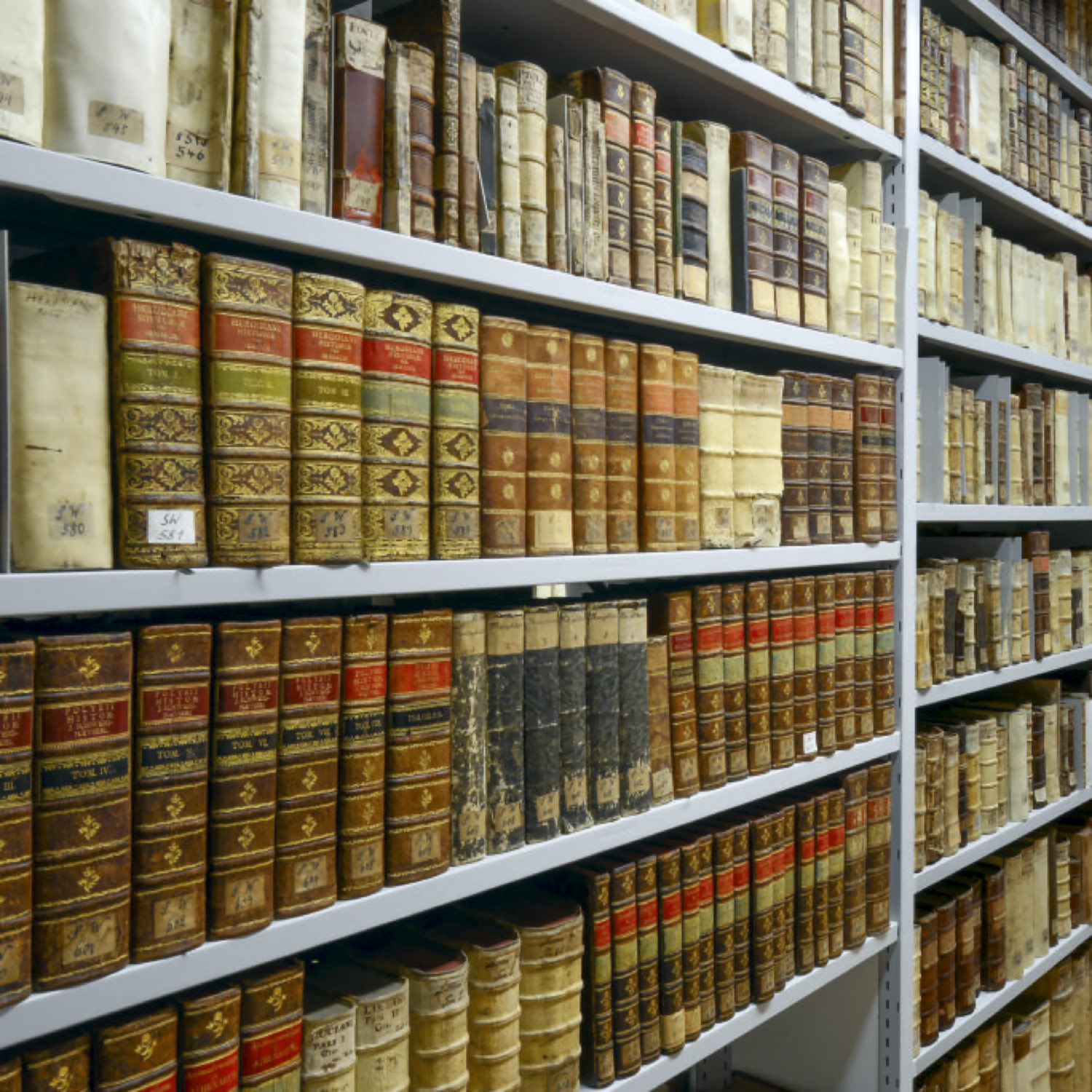
© Reformationsgeschichtliche Forschungsbibliothek Wittenberg
https://www.historische-kommission-fuer-sachsen-anhalt.de/veranstaltungen/tagungen/privatbibliotheken

https://www.historische-kommission-fuer-sachsen-anhalt.de/
Organiser: Historical Libraries Working Group of the Historical Commission for Saxony-Anhalt in cooperation with the Reformation History Research Library Wittenberg
#moderndenken
With the kind support of the Landes Sachsen-Anhalt, the MIK-Center GmbH, the Stiftung Evangelisches Anhalt and the City of Dessau-Roßlau.
Scientific management: Dr. Jan Brademann, Martine Kreißler, Dr. Matthias Meinhardt
Venue: Dessau, Old Water Tower (Heidestraße 21, 06842 Dessau-Roßlau)
Participation: Participation is free of charge. We ask for registration by e-mail.
Information and registration: Reformationsgeschichtliche Forschungsbibliothek Wittenberg, Schlossplatz 1, 06886 Lutherstadt Wittenberg
E-Mail: sekretariat@rfb-wittenberg.de | Tel.: +49 34 91 50 69 200
Travelling exhibition "Landesväter. The Weimar Republic in the Regions" touring exhibition in Dessau-Roßlau from 23.08.-20.09.2023
The Adult Education Centre Dessau-Roßlau begins its autumn semester after the summer holidays with a new, broad-based educational programme. In this context, the Dessau-Roßlau Municipal Archive, in cooperation with the Adult Education Centre, presents the travelling exhibition “Landesväter. The Weimar Republic in the Regions” by the Society for the Study of the History of Democracy (GEDG).
The exhibition in the form of a multimedia station is dedicated to federalism in the Weimar Republic. On the one hand, it presents the state history of the respective region, but also focuses on decisive political actors of the Weimar years. The aim is to recall the supporters and defenders, but also the critics of the Republic, who are largely unknown today.
On 23 August 2023, at 5 p.m., Dr. Marc Bartuschka of the Society for the Study of the History of Democracy will open the touring exhibition with a verbal tour of the exhibition’s concept, the historical background of the Weimar region and its national fathers.
Accessible exhibition venue:
Multigenerational House,
Erdmannsdorffstr. 3,
Dessau-Roßlau
Opening hours:
23 August 2023 – 20 September 2023
Monday to Friday from 8 a.m. to 8 p.m.
Opening event:
Wednesday, 23 August 2023 at 5 p.m.
The exhibition can be visited free of charge during opening hours. The Stadtarchiv and the Volkshochschule Dessau-Roßlau cordially invite all interested parties to attend.
Contact person GEDG:
Katharina Vogt
Public Relations Officer
E-mail: katharina.vogt@gedg.org
Telefon: 0176/34558715
Contact organiser in Dessau-Roßlau:
E-Mail: stadtarchiv@dessau-rosslau.de
Phone: 0340/204 1024


Tuschezeichnung „Konzentrationslager Roßlau 1933-34“
In the Roßlau “Volkshaus”, a former SPD meeting place, the Anhalt state ministry set up a “transitional concentration camp” on 12 September 1933, which existed until 31 July 1934. During this period, 250 to 300 male political prisoners were imprisoned and mistreated there. Almost all of them came from Anhalt. The camp was directly subordinate to the Dessau chief prosecutor Erich Lämmler, and the guard force consisted of members of SS Standarte 59. The prisoners who were fit for work had to perform forced labour in Roßlau and the surrounding area; physical and mental abuse by the guard force, but also by members of the Dessau political police, was the order of the day. A memorial stone in Roßlau commemorates the prisoners of the concentration camp.
Among those tortured in Roßlau – and earlier in the Oranienburg concentration camp – was Hugo Jacoby (1875-1935), a Dessau communist and functionary of the proletarian Red Aid of Jewish descent. He died soon afterwards, on 17 August 1935, in Dessau and was buried in the Israelite cemetery. Mrs Elisabeth Seger and her daughter Renate, who was barely one and a half years old, were also imprisoned in Roßlau – in “forced detention” so that her husband Gerhart Seger would surrender to the German authorities. The Social Democrat Gerhart Seger had been able to escape from the Oranienburg concentration camp to Prague in December 1933, where he wrote down his account of his experience, “Oranienburg: First Authentic Report of a Man Escaping from the Concentration Camp”, which received great international attention after its publication. After fierce public protests, Elisabeth and Renate Seger had to be released from the Roßlau concentration camp on 19 May 1934. Former prisoners of the Roßlau concentration camp also wrote down memoirs, some of which are in the Dessau-Roßlau municipal archives. These include the report by Walter Berger, which is also accompanied by an ink drawing presented by the Dessau-Roßlau Municipal Archives as Archive of the Month for September 2023.
City Archive Dessau-Roßlau in the Archive Network Dessau.
Archival of the Month July 2023
“Concentration camp Roßlau 1933-34”, ink drawing by Walter Berger (o. D.)
Signature: M 07 No. 90
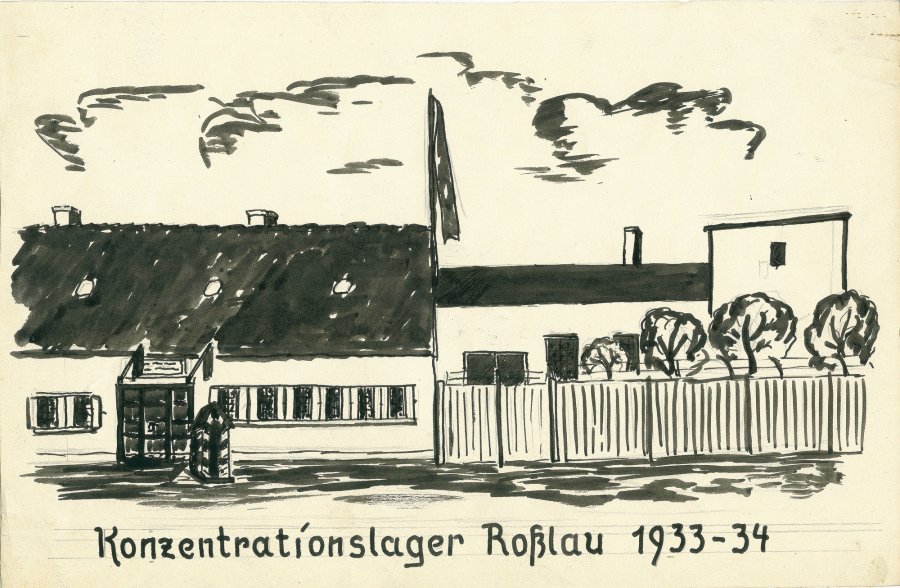

“Roßlau concentration camp 1933-34”, ink drawing by Walter Berger (o. D.)
Signature: M 07 No. 90
Letter from Bauhaus Director Hannes Meyer to Mayor Fritz Hesse concerning the redesign of the Municipal Reading Hall, 7 June 1928.
On 2 October 1897, Dessau’s municipal council decided to purchase a collection of books that the archdeacon Ernst Hesse (1832-1900) had kept as the Christian People’s Library in Zerbster Straße 39 since 1871. With this collection of books as a foundation, the municipal public library opened its doors on 1 May 1898 in the building at Zerbster Straße 66. By the end of its first year of existence, 958 readers had already used the library and borrowed a total of 23,892 books. In the Municipal People’s Library, readers found “works by the most widely read authors, for the most part good and solid works of literature from Germany and abroad”. Only a few years later, the capacity of the building at Zerbster Straße 66 was no longer sufficient. The magistrate acquired the house at Zerbster Strasse 33, which was opposite the town hall, and opened the “Municipal Public Library and Reading Hall” here on 5 January 1905. The reading hall was located on the first floor and had room for 100 readers. At that time, the municipal library had 2,871 permanent readers who could access a media stock of 11,902 volumes. From 1 July 1916, the Municipal Library was closed because its premises were needed for war purposes. It was reopened on 15 September 1919.
In 1928, a comprehensive remodelling of the reading hall, the vestibule and some other rooms of the library was undertaken. The conversion project as well as the implementation of the construction work, including the furnishing with furniture and lamps, was undertaken by the construction department of the Dessau Bauhaus. A corresponding offer for the remodelling of the reading hall, signed by the then director of the Bauhaus Dessau Hannes Meyer (1889-1954) and dated 7 June 1928, is presented by the Dessau-Roßlau Municipal Archives as Archive of the Month for May 2023. The document is part of a magistrate’s file containing further documents on this building project. In the course of the reconstruction of the reading hall, the vestibules and the staircase were also redesigned. The conversion work in the municipal library was completed in October 1928 and cost around 9,000 marks, including the architect’s fee.
The archives of the month of May 2023 as well as other documents can be viewed during the opening hours of the Dessau Archive Association (Mon-Thu 9am-5pm).
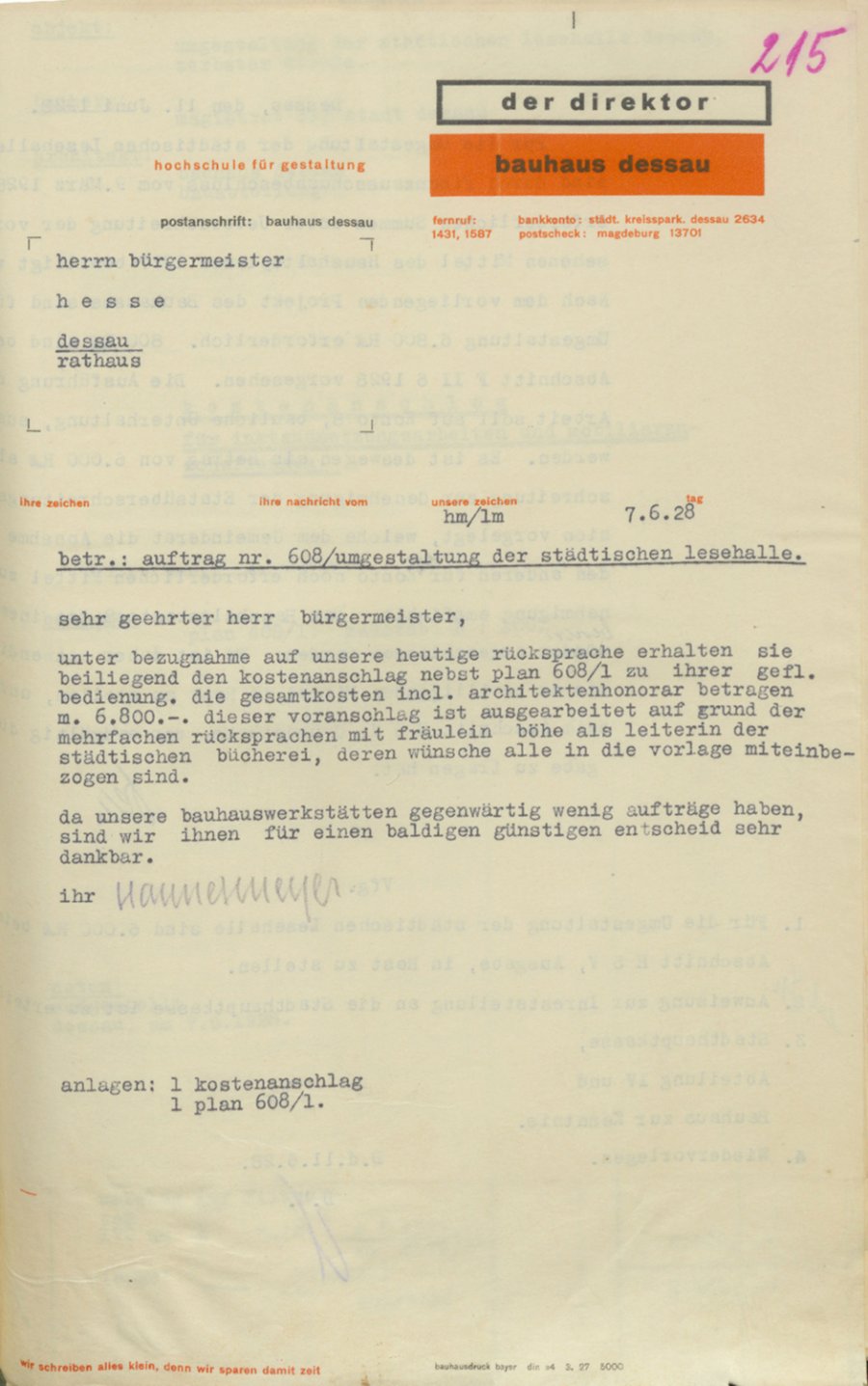

Letter from Bauhaus Director Hannes Meyer to Mayor Fritz Hesse concerning the redesign of the Municipal Reading Hall, 7 June 1928.
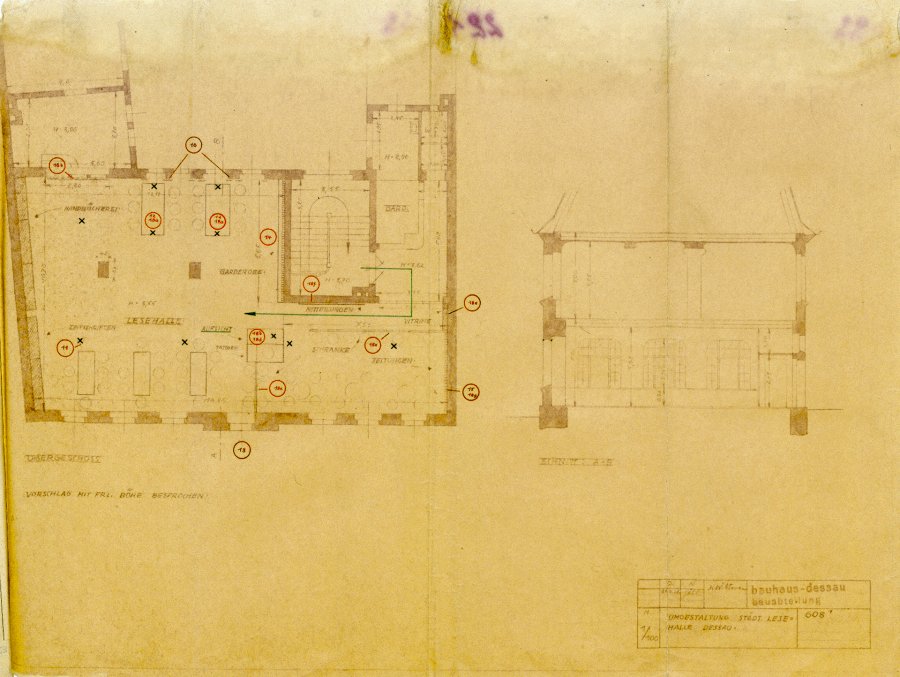

New web page
Our homepage is currently being revised. Unfortunately, not all the content of the old website is yet available on the new website.
However, the contents of the old site can still be accessed. You can get there via the following link: https://www.alb-dessau.de/old/

